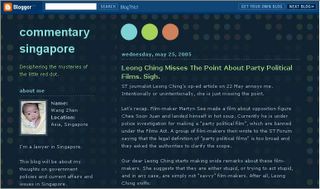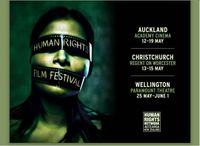Singapore Review
31 May 2005
The next time you have difficulty explaining what "Nepotism" or "FamilyDictatorship" is to someone, try mentioning some familiar names in Singapore's million dollar ministerial cabinet as examples.
Singapore is now so internationally renowned for its special brand of legitimised corruption and nepotism that the dictionary definition of the term "Nepotism" and "Family Dictatorship" includes mention of Singapore's First Familee in the explanation. (See also under Successful Transition of Power where Singapore is included with many modern day dictators and despots).
In many On-line dictionaries and encyclopedias, Nepotism and Corruption are now synonymously linked with Singapore's Ruling Elite and first Familee. The folowing extracts are from Wikipedia, the free on-line encyclopedia.
http://en.wikipedia.org/wiki/Nepotism
"Nepotism is a common accusation in politics when the relative of a powerful figure ascends to similar power seemingly without appropriate qualifications. For example, in America, politically powerful families such as the Kennedy family and Bush family in American politics are sometimes accused of nepotism by critics. Recently, U.S. Senator Frank Murkowski, when elected Governor of Alaska, appointed his daughter Representative Lisa Murkowski to fill the remaining two years of his seat and was accused of nepotism. (Murkowski won reelection on her own in 2004.) Families elsewhere have also dominated politics of their homeland, such as Tun Abdul Razak, second Prime Minister of Malaysia and his son, Najib Tun Razak, current Deputy Prime Minister of Malaysia, or Minister Mentor Lee Kuan Yew (first Prime Minister of Singapore) and his son, Lee Hsien Loong, who recently succeeded Goh Chok Tong as Prime Minister of Singapore."
http://en.wikipedia.org/wiki/Family_dictatorship
Family dictatorship
"A family dictatorship is a form of dictatorship that operates much like an absolute monarchy, yet occurs in a nominally republican state and is not part of its laws. When the dictator of a family dictatorship dies, one of his relatives (usually his son) becomes the new ruler of the country. This transition often occurs after years of "grooming" the dictator's successor as heir apparent."
"Successful transitions of power
Nicaragua: Anastasio Somoza García (1937-1947, 1950-1956) succeeded by his son Luis Somoza Debayle (1956-1963). There was also a third Somoza president, Anastasio Somoza Debayle (1967-1972, 1974-1979), though he did not directly succeed the other two.
Haiti: François Duvalier (1957-1971) succeeded by his son Jean-Claude Duvalier (1971-1986)
Republic of China (from 1949 on Taiwan): Chiang Kai-shek (1928-1975)indirectly succeeded by his son Chiang Ching-kuo (1975-1988)
North Korea: Kim Il Sung (1948-1994) succeeded by his son Kim Jong Il (1994- )
Syria: Hafez al-Assad (1971-2000) succeeded by his son Bashar al-Assad (2000- )
Congo-Kinshasa: Laurent Kabila (1997-2001), succeeded by his son Joseph Kabila (2001)
Azerbaijan: Heydar Aliyev (1993-2003) succeeded by his son Ilham Aliyev (2003- )
Singapore: Lee Kuan Yew (Prime Minister 1959-1990, Senior Minister 1990-2004, Minister Mentor 2004-), indirectly succeeded by his son Lee Hsien Loong (2004-)"
The strange thing is that while the entire world is aware of this glaring injustice and abuse of power, Singapore's local government owned media are trying hard to avoid acknowledging and discussing this troublesome and embarassing interpretation.






